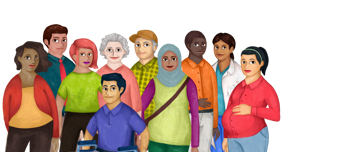In July, the All of Us Research Program established a working group of its advisory panel to help inform the program’s plans for enrollment of children. The Child Enrollment Scientific Vision Working Group has now completed its report, outlining key scientific opportunities that may be enabled by the inclusion of children from diverse backgrounds in the program.
“Two of the core values of the All of Us Research Program are to reflect the rich diversity of the United States and to allow everyone who wants to participate in the program the opportunity to do so. The inclusion of children into the cohort is consistent with both these core values and adds significant scientific validity and utility to the research resource,” wrote the report authors. “Including children in the All of Us cohort will allow researchers to address critical issues in children’s health, as well as to better understand the developmental origins of adult disease.”
The report outlines four key themes that encompass a variety of scientific opportunities relevant to child health:
- Multiple contributors to health: biology, behavior, and social and physical environments: Researchers have identified many different factors that influence child health. Now they want to better understand how these factors work in combination to alleviate or compound health problems.
- Positive health: primary prevention and resilience: Tailored prevention strategies rely on knowledge about disease onset and the preclinical stages of disease, as well as on risk factors and the resilience factors that help protect at-risk individuals. Research studies with children may yield more information about early warning signs, or early resilience factors, that could help improve prevention efforts.
- Importance of the family context: Families play an important role in child health and wellbeing. Future research can reveal more about the impact of family attitudes, relationships, and environments on fluctuations in child health and development.
- The life course and intergenerational perspective: Certain exposures and experiences during critical windows of development can have harmful effects on health and learning over the long term. Researchers seek to learn more about these early influences to identify potential interventions.
The working group delivered its report to NIH and the All of Us Research Program Advisory Panel. Now, the program’s Special Populations Committee will examine the practical considerations of child enrollment and data collection involving children and identify needed updates to the program’s protocol, for review by the All of Us Institutional Review Board prior to implementation.
“From the very start, we have been committed to including children in this research effort,” said Eric Dishman, director of the All of Us Research Program. “The working group’s report offers a valuable starting point to achieve this vision. I'm grateful for the time and dedication they put into their work.”
